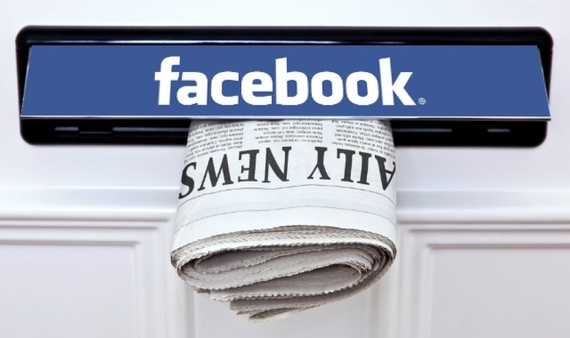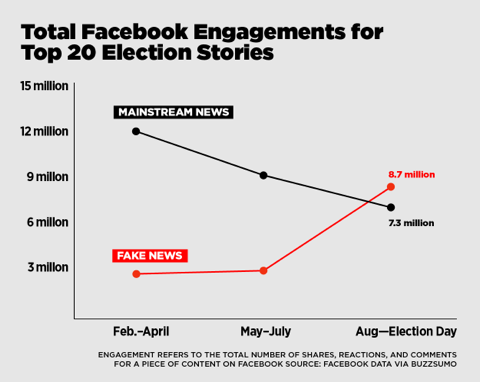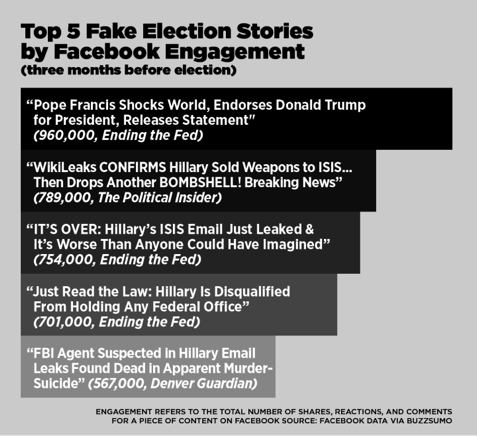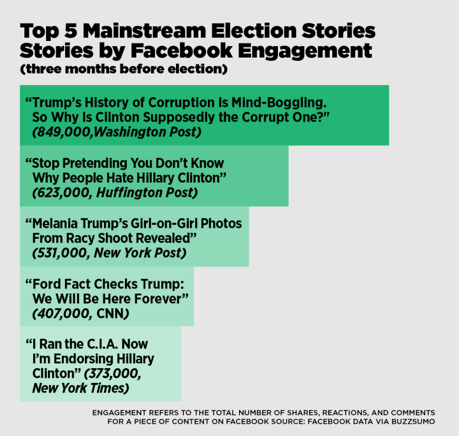"A Lie Can Travel Halfway Around the World While the Truth Is Putting On Its Shoes." -Mark Twain (no one knows for sure if he said it)
Even if he didn't say it (and if you know--one way or another--please tell), it is prescient in its meaning today.
Fake news is all the rage these days, invoking righteous indignation from many...but especially, it seems, from the formerly credible historical news sources (I hate calling them "traditional") that have focused their ire and indignation on the likes of Google and Facebook as the source of the evil.
Now, while their reach, penetration and desperate need to monetize make them vulnerable targets--and, I'd add, deserving targets as well--to lay the full blame on them is to ignore human behavior and the sad self-righteousness of what we call the Press.
Need I say more than the Columbia Journalism Review of a Rolling Stone piece:
Rolling Stone published "A Rape on Campus: A Brutal Assault and Struggle for Justice at UVA" on Nov. 19, 2014. It caused a great sensation. . . The online story ultimately attracted more than 2.7 million views, more than any other feature not about a celebrity that the magazine had ever published. . . The magazine set aside or rationalized as unnecessary essential practices of reporting that, if pursued, would likely have led the magazine's editors to reconsider publishing Jackie's narrative so prominently, if at all. The published story glossed over the gaps in the magazine's reporting by using pseudonyms and by failing to state where important information had come from. . .
As at other once-robust print magazines and newspapers, Rolling Stone's editorial staff has shrunk in recent years as print advertising revenue has fallen and shifted online. The magazine's full-time editorial ranks, not including art or photo staff, have contracted by about 25 percent since 2008. Yet Rolling Stone continues to invest in professional fact-checkers and to fund time-consuming investigations like Erdely's. The magazine's records and interviews with participants show that the failure of "A Rape on Campus" was not due to a lack of resources. The problem was methodology, compounded by an environment where several journalists with decades of collective experience failed to surface and debate problems about their reporting or to heed the questions they did receive from a fact-checking colleague.
Or what about the storied New York Times:
A staff reporter for The New York Times committed frequent acts of journalistic fraud while covering significant news events in recent months, an investigation by Times journalists has found. . . The reporter, Jayson Blair, 27, misled readers and Times colleagues with dispatches that purported to be from Maryland, Texas and other states, when often he was far away, in New York. He fabricated comments. He concocted scenes. He lifted material from other newspapers and wire services. He selected details from photographs to create the impression he had been somewhere or seen someone, when he had not... the Times journalists have so far uncovered new problems in at least 36 of the 73 articles Mr. Blair wrote since he started getting national reporting assignments late last October. In the final months the audacity of the deceptions grew by the week, suggesting the work of a troubled young man veering toward professional self-destruction...Every newspaper, like every bank and every police department, trusts its employees to uphold central principles, and the inquiry found that Mr. Blair repeatedly violated the cardinal tenet of journalism, which is simply truth....Five years' worth of information about Mr. Blair was available in one building, yet no one put it together to determine whether he should be put under intense pressure and assigned to cover high-profile national events.
Or how about USA Today, as told by The New York Times:
The reporter, Jack Kelley, 43, was with the newspaper for 21 years before he resigned in January after admitting that he conspired with a translator to mislead editors overseeing a probe into his articles. After he resigned, a new investigation began to determine whether he had plagiarized stories. . . Incidents of plagiarism and phony reporting have rocked the journalism industry in recent years; last year, The New York Times discovered that a reporter, Jayson Blair, had fabricated or plagiarized portions of more than three dozen articles. The USA Today team is continuing to examine Mr. Kelley's work. The newspaper said it will withdraw prize entries it made on his behalf and will flag stories of concern in its online archive. "As an institution, we failed our readers by not recognizing Jack Kelley's problems," the newspaper's publisher, Craig Moon, said. "For that I apologize. In the future, we will make certain that an environment is created in which abuses will never again occur."
Columbia Journalism Review reported on even The Washington Post:
Janet Cooke, a reporter for The Washington Post, was awarded the Pulitzer Prize April 13, 1981, for feature writing with a story about an 8-year-old heroin addict. She later returned the Prize when it was discovered the boy did not exist.
Fake news is not a new phenomenon. I have found references going back hundreds of years. Here's one from The New York Herald, the predecessor of The New York Times:
The 1874 Central Park Zoo Escape was a hoax perpetrated in the New York Herald on November 9, 1874. The Herald's cover story claimed that there had been a mass escape of animals from the Central Park Zoo and several people had been killed by the now free-roaming beasts. A rhinoceros was said to be the first to escape, goring his keeper to death and setting into motion the escape of his neighbors. Other animals that the Herald reported free included "a polar bear, a panther, a Numidian lion, several hyenas, and a Bengal tiger." At the end of the lengthy article, the following notice was the only indication that the story horrifying readers across the city was a hoax: "Of course, the entire story given above is a pure fabrication. Not one word of it is true." That was not enough to assuage critics, however, who accused Bennett of inciting panic when the extent of the hoax became widely known.
What they all have in common is that in reality there is no excuse for any of them. In each instance the fraud was perpetrated by a trusted source, either on purpose or by lack of oversite, but the bottom line is that they themselves were the source of the virus.
Facebook, in particular, faces a different challenge. Since Facebook doesn't create content--it only distributes the posts and rantings of others--it doesn't deem itself a media channel and therefore has a different--and I'd say more difficult to oversee-- kind of accountability.
Witness the following from Deutsche Welle's article "How Donald Trump is making money for Macedonia's internet entrepreneurs":
Ever wonder what makes people in a remote European country actively engage in the US elections? Dozens of young entrepreneurs in Macedonia are promoting Donald Trump's candidacy on the internet - for a solid profit.
Donald Trump might be one of the most criticized and controversial politicians on the planet, but the profit he brings makes him very appealing to dozens of young entrepreneurs in Macedonia. The phenomenon of pro-Trump click-bait political news websites is flourishing in the Balkan country, bringing earnings of up to 30,000 euros ($33,273) per month.
Veles, a town of 40,000 in central Macedonia, is the home of the first internet entrepreneurs that capitalized on this phenomenon as early as the Republican primaries this year.
The phenomenon quickly caught the attention of the media. In August 2016, The Guardian identified more than 150 domains registered to people claiming addresses in Veles. Although not all of them were associated with active websites, most were actively supporting Trump's presidential campaign.
DW talked with the creator of one of the pro-Trump websites, who agreed to speak with us on condition of anonymity. The man, who wished to be called DD, said that he works with another associate and at the end of the month, they share the website's profits which range from 600 to
1,000 euros ($665 -$1109) - a solid income in a country where the average salary is around 300 euros ($332) per month. "1 percent of the websites in Macedonia earn up to 30,000 euros, ten percent from 1,000 to 2,000 ($1109- $2,218) and the rest up to 500 euros ($554) per month," he told DW.
"I needed something that is viral, that people like to read, that they are following. Something for which there is big interest in America. Now, the elections are a popular theme in USA. So I told myself, what else if not politics? I've been following the political scene for six years and I saw a possibility for profit," he explained.
The entrepreneur doesn't deny that part of the articles that are published contain untruthful information and that the bombastic headlines serve to attract visitors.
"In the last three months, 80-90 percent of the articles we published were original. Before that, we copied and combined content from other news websites such as Business Insider and CNN. The ones we publish right now are partly satire, around 5 percent. Those are not entirely true, but the most popular. They have unconfirmed information, something that is not true, speculations," DD added.
Pro-Hillary articles are not popular.
Political websites are not the only source of profit for internet entrepreneurs from Macedonia. "There are around 1,000 websites that are produced for the American public. Some of them are about politics and the rest are is lifestyle, fashion etc," DD explained. But it's not the interest in US politics that drives young entrepreneurs. According to official statistics, thousands of Macedonians leave their country every year in search for a better life in Western Europe or North America. The unemployment rate among the youth is over 50 percent. But why pro-Trump?
"95 percent of the websites produced in Macedonia are pro-Trump and with a good reason. At the beginning, I tried to produce pro-Hillary articles, but no one would read them - and actually I support Hillary's policies," he told DW.
"Hillary for prison 2016″- a Facebook page under this name is liked by over 750,000 people. It brings daily "news" on the latest developments in the US presidential race from various sources like viralliberty.com. One of its most viral posts from November 1, claiming Hillary Clinton is implicated in the murder of a whistleblower, gathered more than 7,700 reactions and 16,000 shares. Considering the ferocity and the level of misinformation in the US presidential campaign, there is nothing unusual in this post, apart from the fact that its origins have nothing to do with the US or either of the presidential candidates. Search for usanewsflash.com, americarightnow.com, 365usanews.com, worldpoliticus.com and the narrative is the same, as is their origin: Macedonia. Besides Veles which is home to most internet entrepreneurs, click-bait websites are produced in other cities such as Kumanovo, Skopje and Stip.
"I know people from Kumanovo who are in the website business for 4-5 years and have registered up to 15 domains. Many of them hide the domain and website information because competitors from Macedonia are reporting their accounts as fraudulent - which might lead to suspension from the advertising system."
It's not hard to imagine that an American voter can be manipulated to click on a headline such as, "THIS IS THE END FOR HILLARY: FBI got a court order to investigate the new emails from Clinton." Such captions draw attention and clicks bring profit.
The owners make money from the advertisements that are shown on the websites and the tabloid-like titles help them spread fast on social media, which is the main channel of distribution. The easiest way to achieve that is through AdSense- a program that allows website owners to make money by displaying Google ads. It depends on the number of impressions and clicks that the story can generate. Parallely, by posting sensationalist stories on big social networks like Facebook, Macedonian entrepreneurs can reach much larger public and generate a lot of traffic.
But internet entrepreneurs are concerned that the end of the presidential race could mean the end of their profit run. DD is being careful: "I'm waiting to see what happens after the US elections. I will continue with my business if it still has an effect."
The bottom line is that everyone makes money in this scheme and therein we find the problem.
Look at these statistics from BuzzFeed:
In the final three months of the US presidential campaign, the top-performing fake election news stories on Facebook generated more engagement than the top stories from major news outlets. . . The 20 top-performing false election stories from hoax sites and hyperpartisan blogs generated 8,711,000 shares, reactions, and comments on Facebook. . .Within the same time period, the 20 best-performing election stories from 19 major news websites generated a total of 7,367,000 shares, reactions, and comments on Facebook.
Yet the problem is not new--it's just that it has finally hit Western shores. As reported by The New York Times:
Well before last week's American election threw Facebook's status as a digital-era news source into the spotlight, leaders, advocacy groups and minorities worldwide have contended with an onslaught of online misinformation and abuse that has had real-world political repercussions. And for years, the social network did little to clamp down on the false news. . .
"They should have done this [clamp down] way earlier," said Richard Heydarian, a political analyst in the Philippines, one of Facebook's fastest-growing markets. "We already saw the warning signs of this years ago."
"If everything seems to be the same and no distinctions are made, then we won't know what to protect," Mr. Obama said. . .
. . . Ms. Merkel has said she is considering plans to force social networks to make public how they rank news online. Some African countries have banned the use of Facebook, WhatsApp and Twitter before elections. Indonesia's government has closed sites that it says promote fake news, though experts say some portals were also targeted for political reasons. . . One such place is the Philippines, where a spokesman for its populist president, Rodrigo Duterte, shared on Facebook an image of a corpse of a young girl believed to have been raped and killed by a drug dealer. Fact checkers later revealed that the photo had come from Brazil. . . Tens of thousands of Philippine Facebook users also recently shared a story claiming that NASA had voted Mr. Duterte "the best president in the solar system."
"Facebook hasn't led to empowerment of the average citizen, but empowerment of professional propagandists, fringe elements and conspiracy theorists," said Mr. Heydarian, the Philippines political analyst. "Voices that were lurking in the shadows are now at the center of the public discourse."
"Algorithms must be more transparent," Ms. Merkel has said, "so that interested citizens are also aware of what actually happens with their own media behavior and that of others."
Christian Echle, director of the Sub-Sahara Africa media program at Konrad-Adenauer-Stiftung, a German political foundation, said such actions were heavy-handed and that social media had played a role in helping voters -- many located far from urban centers -- to gain access to much-needed information and interact with political candidates..."There's a big, big threat -- that social media will deepen existing gaps in these societies," said Mr. Echle, who is based in Johannesburg. "People are still learning how to use social media, so many can easily fall for hoaxes."
But I think I'd have to add that the "media" that propagated the exaggerations, falsehoods and out-and-out lies of both candidates (please spare us all the KNEE JERK of who lied more... it's not the point), and then relished in the megawatt, megaphone effect of social media, often bragging about the numbers of shares they received, are equally guilty and maybe even more so.
The Financial Times said it best:
Surely having Facebook and Google restrict advertising on subjective grounds is the worst possible outcome of this entire affair?. . . The rot at the core of media has little to do with the propagation of fake news on the fringes. Alternative news sites and underground press with questionable journalistic practices have been a phenomenon since forever. In free societies, the public sphere tolerates single-issue publishers, special interest groups or anti-establishment newsletters, because we know that for every outlet which propagates nonsense there's another that might be ahead of the curve on a topic of great cultural, commercial or political significance...To the contrary, what really underpins the malaise of modern digital media is the medium's inability to properly contextualise the news as well as the commercial impulse to prioritise comment over everything (because that's where the money is)...What the web model did, even before the Facebook and Google phenomenon exacerbated the echo chamber, is de-contextualise news and place it in a silo...Like it or not, reading a physical newspaper frames the facts with other facts and opinions. So, even if a single issue dominates a reader's mind, a turn of the page can expose him to other ideas, stories and issues. . . As to the issue of what's really wrong with the media, the simple adage that you get what you pay for and that if it's free you are the product is much more insightful. . . If you value truly balanced and verified news; if you value comment which scrutinises vested interests, business models or government policy; or if you value being confronted by views which are different from your own but still well argued, pay for the news, don't just get it from Facebook. . . Based on all that, if Facebook and Google moves to filter "fake news" it will only exacerbate the problem because these institutions will always be governed by commercial interest not public duty.
You get what you pay for....
Both Google and Facebook have started to take steps to try to regulate the issue. I'm not ready to comment on that yet...maybe next week.
But I do want to know how you feel and what your view is...as I formulate my thinking I really need the help.
Let me end as I began with Mark Twain, this time with a verified quote. Listen:
"Truth is mighty and will prevail. There is nothing the matter with this, except that it ain't so." -Notebook, 1898
Frankly that seems to be fairly true, no?
Only a few years later, a lot more cynical Twain said:
"Never tell the truth to people who are not worthy of it." -Notebook, 1902
An epithet for our times? Maybe we aren't worthy...
What do you think?
What do you think?
Read more at The Weekly Ramble
Follow David Sable on Twitter: www.twitter.com/DavidSable




